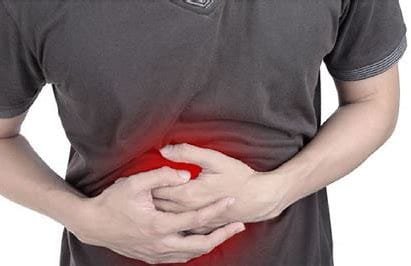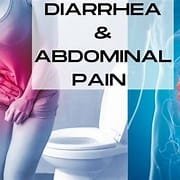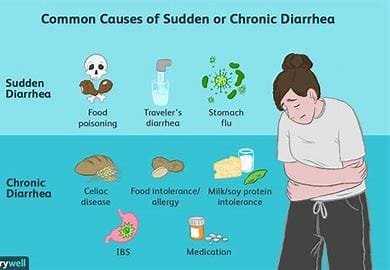Diarrhea is a condition that occurs in any kind of patient, irrespective of age. It is the passage of loose or watery stools several times a day, usually more than three times in a single day. Though mostly benign and transient illness, sometimes diarrhea may be associated with an underlying serious disease or condition.
Hence, the causes, symptoms, side effects, and treatment alternatives for diarrhea are quite crucial for taking effective control over this condition.
Causes of diarrhea

Diarrhea can be caused by a wide variety of factors that may be infectious: food intolerance, drugs, or gastrointestinal disorders. Some of the usual causes are:
Infections. Diarrhea is often the result of viral, bacterial, or parasitic infections. Common viruses causing infections are norovirus, rotavirus, and adenovirus and are likely to occur in children. Most people contract bacterial infections through contaminated food and water; examples include but are not limited to Salmonella, Escherichia coli (E. coli), and Campylobacter. Parasitic infections, such as Giardia or Cryptosporidium, may also cause diarrhea.
Food Intolerances: Diarrhea may be a symptom of food intolerance or allergy. The most common cause is lactose intolerance, where the individual cannot digest lactose, a sugar found in milk and dairy products.
Gluten intolerance—gluten intolerance also presents as celiac disease—can cause chronic diarrhea.
Medications: Certain medications may cause an imbalance in the gut between good and pathogenic bacteria, resulting in diarrhea. In medical terms, this is termed antibiotic-associated diarrhea; it is brought about by the decreased beneficial gut bacteria that permits pathogenic bacteria to multiply.
Other causes of diarrhea due to medication are laxatives, chemotherapy drugs, and magnesium-containing antacids.
Various chronic digestive disorders may also cause chronic diarrhea.
This class includes irritable bowel syndrome, IBD comprised of the causes of Crohn’s disease and ulcerative colitis, and small intestine bacterial overgrowth, or SIBO, where the otherwise normal-functioning bacterial population in the small intestine becomes overgrown in numbers.
Traveler’s Diarrhea: The other popular form of diarrhea is traveler’s diarrhea, which people develop while taking trips to areas where waste or sewage disposal is poor and food and water are contaminated with bacteria, viruses, or parasites.
Stress and anxiety: Stress and anxiety contribute much to emotional states that can further interfere with the digestion process, bringing on diarrhea. This kind of diarrhea is often called “nervous diarrhea.”
Diarrhea Symptoms
Diarrhea primarily manifests as the frequent passage of loose, watery stools. However, other symptoms may accompany diarrhea, depending on the cause of the disease:
Abdominal Cramps: Most patients feel cramping or pain in the abdomen while having a bout of diarrhea. It is often caused by increased activity within the intestines.
Bloating: Bloating or a feeling of fullness is another very common symptom of diarrhea and is usually caused by gas buildup in the intestines.
Urgency: The urge to pass stools can suddenly come and become intense, leading to a lack of control over stool-bowel movement.
Fever: If an infection accompanies diarrhea, a fever is likely with such infections and could possibly be caused by bacterial or parasitic infections.
Nausea and Vomiting: Some people experience nausea and vomiting alongside diarrhea, especially in viral gastroenteritis, colloquially known as the stomach flu.
Dehydration: diarrhea is the third most prominent symptom, resulting from a gross loss of fluids and electrolytes.
The prodromal symptoms of dehydration include dryness in the mouth, excessive thirst, easy tiredness, dizziness, and reduced urine output.
Complications and Side Effects

Diarrhea is usually self-limiting; however, it leads to several complications, especially if it lasts for a long time:
Dehydration: The most severe consequence of diarrhea is dehydration, especially in infants aged under five years, the older ones, and immunocompromised persons. Electrolyte imbalances can prove fatal and necessitate immediate medical attention. They can cause muscle spasms and weakness and irregular heartbeats due to dehydration.
Malnutrition: Nutrient uptake is affected, and consequently, malnutrition develops mostly in children. This contributes to loss of weight, general weakness, and easy cycles of infections.
Anus Irritation: Irritation occurs around the anus area due to frequent bowel movements. They can become painful and may eventually cause the formation of hemorrhoids.
Conversely, diarrhea can be considered chronic if it persists for longer than four weeks. Chronic diarrhea can be an indicator of an underlying condition, such as IBD or IBS, requiring continued treatment and management.
Treatment and Management of Diarrhea
Management of diarrhea involves those actions taken to control its cause as well as its symptoms so that complications do not develop. Probably the most commonly applied approach is:
Rehydration: Dehydration is the most significant villain in the treatment of diarrhea. Fluids and electrolyte replacement can often be achieved with the assistance of oral rehydration solutions containing a mixture of water, salts, and sugar. Intravenous fluids may also prove necessary in severe cases.
Dietary Modification: Even the mild forms of the diseases benefit from dietary modifications because patients can alleviate some symptoms by avoiding spicy, fatty, and high-fiber foods. The BRAT diet is prescribed to most patients, in which food items used are bananas, rice, applesauce, and toast. These are often bland, low in fiber, and easier to digest for the diarrhea patient.
Probiotics: Other probiotics are helpful bacteria that help restore one’s normal intestinal flora, especially after the use of antibiotics. They may even shorten the time spent with diarrhea in some people.
Medication: In the majority of diarrheal illnesses, the over-the-counter medication loperamide (Imodium) can slow the movement of the intestines and thus decrease diarrhea. However, in the case of no infection, these should only be used and not when the passage of stool is slowed down to trap harmful bacteria inside. In a bacterial infection, an antibiotic from the clinician is considered necessary.
For diarrhea caused by a chronic disease, such as IBS, IBD, or celiac disease, treatment must be addressed to the underlying condition, and diet, medicine, and long-term follow-up care all contribute to its management.
Prevention of diarrhea
Even in those cases in which diarrhea is the cause of infection or allergy, it is often preventable with personal hygiene and other precautions, especially when traveling or during outbreaks of infectious illnesses. Such measures include:
The best way to prevent diarrhea viruses and bacteria is regular handwashing with soap and water.
Safe Food and Water: Ensure food is well cooked; do not consume raw and undercooked foods. When you are traveling to other areas, do not take tap water, ice cubes, or unpeeled fruits and vegetables since these may make one contract diarrhea.
Vaccination: Some pathogens causing diarrhea are vaccine preventable. Immunization in the young age group may prevent severe diarrhea.
Conclusion

Diarrhea is a mild to a grave illness depending on its causes and longevity. The previous understanding of cause, recognition of symptoms, and knowing what is being done to treat it is integral in the prevention of dehydration or malnutrition. This usually resolves with adequate hydration and care; however, medical attention is required when the condition becomes persistent or develops concomitantly with significant symptoms. Good hygiene practices and preventive measures will help prevent the risk of contracting diarrhea in the first place.



